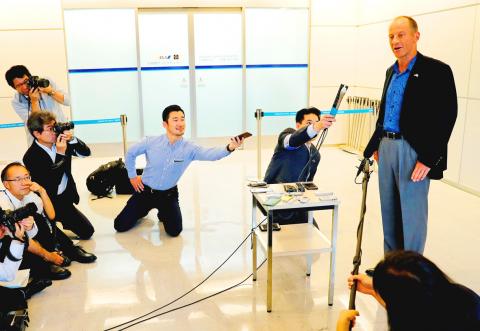South Korea has warned the US of the potential damage from “undesirable” Japanese restrictions on exports of high-tech material to South Korea, as a trade row between the two nations intensifies.
As South Korea sought US help in the dispute, triggered by a disagreement over the issue of compensation for South Koreans forced to work for Japanese firms during World War II, it also took steps to limit the damage to its companies.
South Korea announced that up to 300 billion won (US$255.6 million) would be included in a supplementary budget to cope with Japan’s curbs on exports of three materials crucial for advanced consumer electronics by speeding supply localization.

Photo: Reuters
The Democratic Party said about one-third of the proposed budget would be for supporting South Korean materials and equipment makers to help them get their products to market.
S&P Global Rating Asia-Pacific chief economist Shaun Roache said the dispute is as unpredictable as the US-China trade dispute and is likely to affect South Korea’s growth.
The Japanese restrictions are to affect companies such as Samsung Electronics Co Ltd and SK Hynix Inc, which supply chips to companies such as Apple Inc.
South Korean Minister of Foreign Affairs Kang Kyung-wha late on Wednesday told US Secretary of State Mike Pompeo in a telephone call that Japan’s restrictions might not only damage South Korean companies, but could also disrupt the global supply chain and hurt US firms.
Kang “expressed concern that this is undesirable in terms of friendly relations between South Korea and Japan, and trilateral cooperation among South Korea, the US and Japan,” the South Korean Ministry of Foreign Affairs said in a statement.
South Korea hoped Japan would withdraw the curbs and that the situation would not deteriorate further, it said.
Pompeo said he understood and they agreed to strengthen communication between the three sides, it said.
However, analysts say the US is unlikely to become a mediator.
South Korea and Japan also clashed at the WTO this week.
South Korean National Security Office Deputy Director Kim Hyun-chong arrived in Washington on Wednesday and told reporters he would meet officials from the White House and US Congress to discuss issues that included Japan’s export curbs.
Meanwhile, New US Assistant Secretary of State for East Asian and Pacific Affairs David Stilwell arrived in Japan on the first stop of a 10-day visit to Asia.
He is also scheduled to visit South Korea next week, but did not mention the dispute when he spoke to reporters.
He did say that he was looking forward to talking with Japanese officials about subjects including Iran and North Korea.
“I look forward to some interaction with senior Japanese officials, understanding where we sit today in the free and open Indo-Pacific strategy, as well as discussing topics like Iran and North Korea,” Stilwell told reporters after arriving at Narita International Airport near Tokyo.
Stilwell’s post had been vacant for more than two years, despite major challenges in the region.
He is scheduled to meet senior Japanese diplomatic and defense officials until Sunday, before traveling to the Philippines, South Korea and Thailand.

AIR SUPPORT: The Ministry of National Defense thanked the US for the delivery, adding that it was an indicator of the White House’s commitment to the Taiwan Relations Act Deputy Minister of National Defense Po Horng-huei (柏鴻輝) and Representative to the US Alexander Yui on Friday attended a delivery ceremony for the first of Taiwan’s long-awaited 66 F-16C/D Block 70 jets at a Lockheed Martin Corp factory in Greenville, South Carolina. “We are so proud to be the global home of the F-16 and to support Taiwan’s air defense capabilities,” US Representative William Timmons wrote on X, alongside a photograph of Taiwanese and US officials at the event. The F-16C/D Block 70 jets Taiwan ordered have the same capabilities as aircraft that had been upgraded to F-16Vs. The batch of Lockheed Martin

GRIDLOCK: The National Fire Agency’s Special Search and Rescue team is on standby to travel to the countries to help out with the rescue effort A powerful earthquake rocked Myanmar and neighboring Thailand yesterday, killing at least three people in Bangkok and burying dozens when a high-rise building under construction collapsed. Footage shared on social media from Myanmar’s second-largest city showed widespread destruction, raising fears that many were trapped under the rubble or killed. The magnitude 7.7 earthquake, with an epicenter near Mandalay in Myanmar, struck at midday and was followed by a strong magnitude 6.4 aftershock. The extent of death, injury and destruction — especially in Myanmar, which is embroiled in a civil war and where information is tightly controlled at the best of times —

Taiwan was ranked the fourth-safest country in the world with a score of 82.9, trailing only Andorra, the United Arab Emirates and Qatar in Numbeo’s Safety Index by Country report. Taiwan’s score improved by 0.1 points compared with last year’s mid-year report, which had Taiwan fourth with a score of 82.8. However, both scores were lower than in last year’s first review, when Taiwan scored 83.3, and are a long way from when Taiwan was named the second-safest country in the world in 2021, scoring 84.8. Taiwan ranked higher than Singapore in ninth with a score of 77.4 and Japan in 10th with

China's military today said it began joint army, navy and rocket force exercises around Taiwan to "serve as a stern warning and powerful deterrent against Taiwanese independence," calling President William Lai (賴清德) a "parasite." The exercises come after Lai called Beijing a "foreign hostile force" last month. More than 10 Chinese military ships approached close to Taiwan's 24 nautical mile (44.4km) contiguous zone this morning and Taiwan sent its own warships to respond, two senior Taiwanese officials said. Taiwan has not yet detected any live fire by the Chinese military so far, one of the officials said. The drills took place after US Secretary